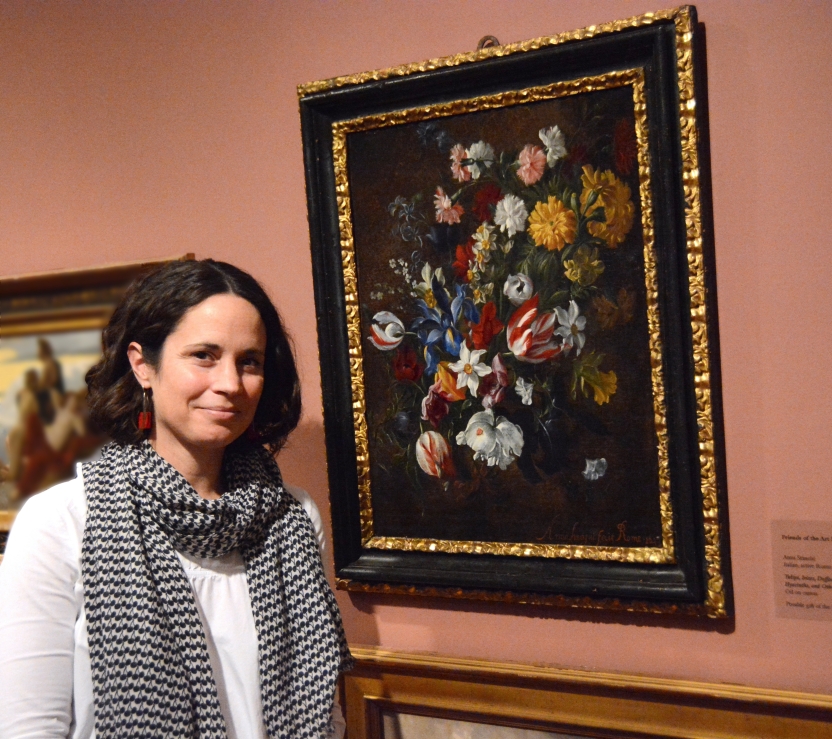Museum Acquires Its First ‘Old Master’ Painting by a Woman Artist

MIDDLEBURY, Vt. – The Museum of Art at Middlebury College has acquired an elegant 17th-century still-life painting by a newly discovered woman artist who lived and worked in Rome in the mid-1600s.
Signed by Anna Stanchi in 1643 and acquired at auction by Middlebury in 2017, the painting represents the Museum’s first “Old Master” painting created by a woman. The term refers to the trained artists, or so-called Old Masters, who worked in Europe prior to the 1800s and belonged to an artists’ guild.
Stanchi’s painting of tulips, irises, daffodils, carnations, and hyacinths is currently hanging in the College Museum and can be viewed during the Museum’s usual Tuesday through Sunday open hours.
Professor Pieter Broucke, art historian and Middlebury’s director of the arts, explained the significance of the acquisition: “There are not many pre-modern female artists to begin with, and so it is remarkable that our Museum was able to add a beautiful and representative work by a female artist working at the height of the Roman Baroque, and about whom we are just now learning a whole lot more.
“The painting is an outstanding addition to our teaching collection of Western paintings, and it will allow students to discuss issues of gender and the relationship between Northern and Southern Baroque artists.”
There were few women artists working in Europe during this time period, said Assistant Professor Carrie Anderson of Middlebury’s history of art and architecture department. “There was Rachel Ruysch, Maria von Oosterwyck, and Giovanna Garzoni. And what is so exciting is that we can now add Anna Stanchi to this list of established women artists.”
The artist came from a well-known Roman family of still-life painters, Anderson said, and it is likely that the Stanchis were influenced by the Dutch artists Jan Breughel the Elder and Daniel Seghers, who were frequent visitors to Rome. Anderson, who specializes in 17th-century Dutch art, believes that Anna Stanchi was influenced by her contemporaries from the Netherlands, and it is possible that her artistry had influence on them.
“Breughel and Seghers popularized the flower garland motif, which clearly had an influence on Anna. However, unlike Brueghel’s highly ordered and symmetrical flower vase paintings, Anna Stanchi’s are more irregular, appearing naturalistic, loose, and spontaneous in comparison. She presents flowers not just from the front, but also from the side, from a three-quarter view, and sometimes from underneath in what I would call her ‘drooping’ flower.”
Stanchi also may have been in contact with a group of Dutch artists called the bentveughels, or birds of a feather, who lived and painted in Rome in the 1640s and 1650s, Anderson believes, and there is the possibility that Stanchi influenced the well-known Dutch painter Willem van Aeslt, who was a member of that group.
“Van Aeslt’s post-Roman still lifes make a decisive break from his earlier works, featuring more spontaneously arranged bouquets and including flowers seen from various vantage points – just as we see with Anna Stanchi’s work,” said Anderson. In van Aeslt’s 1665 painting titled ‘Still Life with Flowers,’ “we even see a nod to Stanchi’s signature drooping flower.”
It has taken nearly four centuries for it to happen, but Anna Stanchi is beginning to gain some of the recognition her work deserves and it’s coming from the art historians at Middlebury.
“She was not simply an amateur painting dabbling in a ladylike hobby, but rather a skilled artist who was trying to market her work,” Anderson explains. “She is an emerging figure in the field and Middlebury is fortunate to have one of her few known works of art in its collection.”

